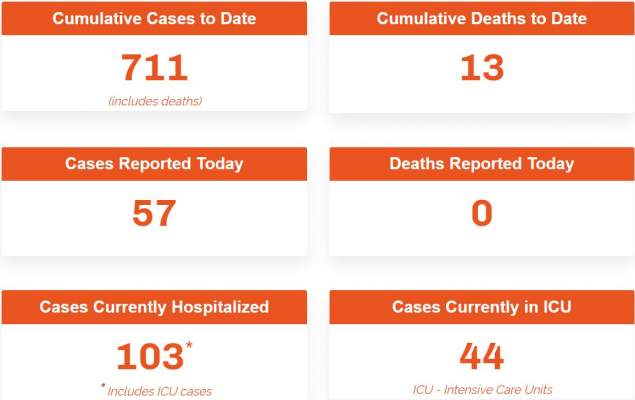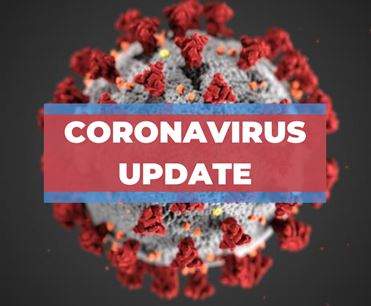
COVID-19 cases are up to 43 now in Santa Ana and 711 Countywide according to the O.C. Health Care Agency.
Cumulative COVID-19 related deaths in Orange County are now up to 13. A total of 103 victims are currently in the hospital and of those 44 are in intensive care units.
Here is how some of the other large cities in Orange County are faring:
- Irvine continues to lead the County with 69 cases
- Newport Beach reports 67 cases
- Anaheim reports 63 cases
- Huntington Beach reports 48 cases
- Laguna Beach reports 29 cases
- Buena Park reports 21 cases
- Orange reports 21 cases
- Garden Grove reports 18 cases
- Costa Mesa reports 14 cases
Incidentally two of the COVID-19 deaths reported in Orange County occurred in the 25 to 34 year-old age group. Seven of the deaths were in the over 65 years-old age group.
As of April 2, 2020, there are a total of 10,701 positive cases and 237 deaths in California, according to the CA Public Health Department.
The CDC reports 239,279 cases nationwide in the U.S. and 5,443 deaths.
How can people protect themselves?
There is currently no vaccine to prevent COVID-19. The best way to prevent illness is to avoid being exposed to this virus. The virus is thought to spread mainly from person-to-person between people who are in close contact with one another (within about 6 feet). This occurs through respiratory droplets produced when an infected person coughs or sneezes. These droplets can land in the mouths or noses of people who are nearby or possibly be inhaled into the lungs. Older adults and people who have severe underlying chronic medical conditions like heart or lung disease or diabetes seem to be at higher risk for developing more serious complications from COVID-19 illness. Every person has a role to play. So much of protecting yourself and your family comes down to common sense:
- Washing hands with soap and water.
- Clean and disinfect frequently touched surfaces daily. If surfaces are dirty, clean them using detergent or soap and water prior to disinfection.
- Avoiding touching eyes, nose or mouth with unwashed hands.
- Cover your cough or sneeze with a tissue or your elbow.
- Avoiding close contact with people who are sick.
- Staying away from work, school or other people if you become sick with respiratory symptoms like fever and cough.
- If you smoke or vape, consider quitting. Smokers who already have lung disease or reduced lung capacity could be at increased risk of serious illness.
- Following guidance from public health officials.
Please consult with your health care provider about additional steps you may be able to take to protect yourself.
Who is at Higher Risk for Serious Illness from COVID-19?
Early information out of China, where COVID-19 first started, shows that some people are at higher risk of getting very sick from this illness. This includes:
- Older adults (65+)
- Individuals with compromised immune systems
- Individuals who have serious chronic medical conditions like:
- Heart disease
- Diabetes
- Lung disease
If you are at higher risk for serious illness from COVID-19 because of your age or health condition, it is important for you to take actions to reduce your risk of getting sick with the disease, including:
- Isolate at home and practice social distancing.
- Wash your hands often with soap and water for at least 20 seconds, especially after blowing your nose, coughing, or sneezing, or having been in a public place.
- Avoiding touching eyes, nose or mouth with unwashed hands.
- Avoid close contact with people who are sick, and stay away from large gatherings and crowds.
- Consider ways of getting food brought to your house through family, social, or commercial networks.
It is also important that you listen to public health officials who may recommend community actions to reduce potential exposure to COVID-19, especially if COVID-19 is spreading in your community.
For more information visit the CDC’s website.
What if I’m sick?
What are the symptoms of COVID-19?
Typically, human coronaviruses cause mild-to-moderate respiratory illness. Symptoms are very similar to the flu, including:
- Fever
- Cough
- Shortness of breath
COVID-19 can cause more severe respiratory illness.
What if I have symptoms?
Patient: If a person develops symptoms of COVID-19, including fever, cough or shortness of breath, and has reason to believe they may have been exposed, they should call their health care provider before seeking care. Contacting them in advance will make sure that people can get the care they need without putting others at risk. Please be sure to tell your health care provider about your travel history. You can also take the following precautionary measures: avoid contact with sick individuals, wash hands often with soap and warm water for at least 20 seconds.Health Care Provider: Patients who may have infection with this novel coronavirus should wear a surgical mask and be placed in an airborne infection isolation room. If an airborne infection isolation room is not available, the patient should be placed in a private room with the door closed. Health care providers should use standard, contact and airborne precautions and use eye protection. Please see “Update and Interim Guidance on Outbreak of 2019 Novel Coronavirus (2019-nCoV) in Wuhan, China” for more information about infection control. The Public Health Department will issue All Facility Letters to regulated healthcare facilities within California with updated information and guidance; these can be found on the AFL webpage.

